Caviar Glossary: A Glossary Of The Different Caviar TypesPage 1: Caviar Glossary A This is Page 1 of an 10-page article. Click on the red links below to visit other pages. This glossary is protected by copyright and cannot be reproduced in whole or part. You are welcome to link to it.
|
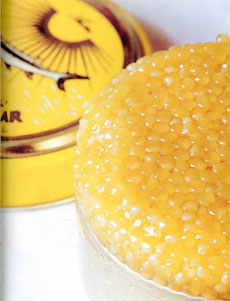 These golden pearls are the rarest caviar in the world, from an albino Osetra sturgeon. |
|
| ACIPENSERIDAE The biological family that includes some 26 species of fish, including the genera Acipenser (Atlantic, Baerii, Lake, Osetra, Sevruga, Siberian, White and other sturgeon) Huso (Beluga and Keluga sturgeon), Scaphirhynchus (Alabama, Pallid and Shovelnose [Hackleback] sturgeons, all native to North America) and Pseudoscaphirhynchus (three species in West Central Asia, including Syr-darya Shovelnose, Amu-dar Shovelnose and False Shovelnose sturgeons). See sturgeon. ALGAE See flavor.
|
||
| ALMAS CAVIAR The world"™s most expensive caviar, almas means “diamond” in Persian. The rarest caviar in the world comes from Osetra sturgeons, age 70 years or older. The chances of finding (1) an albino sturgeon that is (2) more than 70 years old is remote; hence, for those who have the cash, it’s a once-in-a-lifetime experience that is worth eternal caviar bragging rights. The closest we have ever gotten to Almas is a photo. Why 70 years old? The older the fish, the more creamy and subtly-flavored and lighter the eggs. It’s more than$44,000 a kilo, if you could get it—more expensive than gold. |
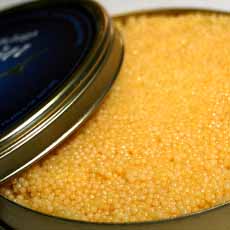 Even the richest people on earth may not be able to get hold of golden Almas caviar. Photo courtesy AlmasCaviar.com. |
|
| ALMAS ARA CAVIAR Almas Ara caviar is a brand of sturgeon caviar that is farmed in Spain, using the indigenous Acipenser naccarii sturgeon. |
||
| AMERICAN BLACK CAVIAR American black caviar is another term for bowfin (choupique) caviar. It comes from an archaic freshwater bony fish that produces black roe that resembles sturgeon roe. The caviar the roe is brownish to jet black in color, very firm, and has a mildly tangy and earthy flavor. See also bowfin caviar.
|
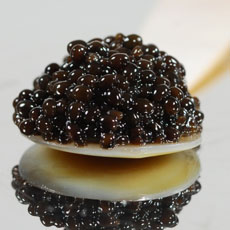 Bowfin caviar. Photo courtesy BackyardGardener.com. |
|
| AMERICAN CAVIARS In the 19th century America, with several indigenous species of sturgeon, was one of the world’s largest caviar producers. Over-fishing depleted the supply, and the government wisely ended commercial fishing. American caviar has again risen to fill the increasing void created by overfishing in the Caspian Sea, which has put the Beluga, Osetra and Sevruga sturgeons on the World Wildlife Foundation’s Endangered Species List. Today, white sturgeon and hackleback sturgeon are farmed in freshwater lakes or tanks in the Pacific Northwest, California and the South, using environmentally conscious and sustainable practices. This has made the U.S. a player again on the world caviar scene. American caviar or roe species can include sturgeon caviar, hackleback caviar, paddlefish caviar, salmon caviar, trout caviar, whitefish caviar and lumpfish caviar. Some consider American sturgeon caviar close to the Russian and Iranian Osetra caviars in taste and texture, although others rank it closer to Sevruga caviar. Whatever, it’s an approximation: Nothing equals splendor of the greatest Caspian caviar, although we’ve had some farmed white sturgeon from Idaho (Transmontanus rex), Israeli Osetra (the Russian sturgeon) and Uruguayan Baerii (Acipenser baerii, the Siberian sturgeon) that get pretty close.
|
 American caviar sampler: sturgeon, hackleback and bowfin. Photo courtesy Russ & Daughters. |
|
| AMERICAN GOLDEN CAVIAR See golden whitefish caviar.
|
||
| AMERICAN STURGEON CAVIAR or CALIFORNIA OSETRA CAVIAR There are about 26 species of sturgeon in the Acpenseridae family, some of which are native to the United States. These include the Wild Atlantic Sturgeon (Acipenser oxyrinchus oxyrinchus) found along the Southeast Atlantic coast (the fishing of which is regulated), the Lake Sturgeon of the Midwest (Acipenser fulvescens), the Shovelnose Sturgeon (Scaphirhynchus platorynchus) of the Tennessee River (whose caviar is sold as Hackleback] and the American White Sturgeon of the Pacific Northwest (Acipenser transmontanus), which is farmed extensively in California. In fact, Acipenser transmontanus is the most common American sturgeon, known to reach a maximum weight of approximately 1,800 pounds and a length of about 20 feet. The eggs of the Wild Atlantic Sturgeon tend to be less firm than Caspian or American farmed caviar. The American White Sturgeon is most comparable in taste to Caspian osetra, and is sometimes called California Osetra. It takes four years to determine the sex of a sturgeon, and eight years until the sturgeon begins to produce roe (some species take longer). The two largest sturgeon farmers in the U.S. are Stolt Sea Farms in Elverta, California, which is owned by the Stolt Sea Farm Group of Norway and markets its caviar under the Sterling name; and Tsar Nicoulai, a family-run operation in San Francisco that sells its California Estate Osetra brand as well as other products. Petrossian sells a private brand, Transmontanus, which is packed for them by Stolt. The three species of American sturgeon from the Scaphirhynchus family are currently endangered: the Alabama sturgeon (Scaphirhynchus suttkusi), Pallid sturgeon (Scaphirhynchus albus) and the Shovelnose sturgeon (Scaphirhynchus platorynchus).
|
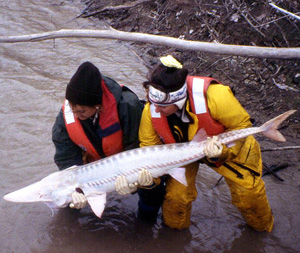 The Pallid Sturgeon, Scaphirynchus albus. Photo courtesy U.S. Fish & Wildlife Service. |
|
| AMIA CALVA The taxonomy name for the bowfin, an ancient American bony fish that produces a hearty black caviar. It is not related to the sturgeon.
|
||
| ANADROMOUS A saltwater fish that moves to freshwater to spawn. The sturgeon is anadromous, moving to freshwater rivers to spawn. One of the reasons for the near extinction of the Caspian sturgeon is the damming of the rivers leading into the Caspian Sea, depriving the sturgeon of their spawning grounds. (The others include pollution, overfishing, both legally and via poaching.)
|
||
| AQUACULTURE The farming of fish. This can take place in indoor or outdoor pools, or in penned areas of rivers.
|
||
| ASETRA or GOLDEN IRANIAN ASETRA CAVIAR Golden Iranian Asetra (the Iranian variation of the spelling of Osetra), typically from the south Caspian Sea bordering Iran, is traditionally reserved for the Shahs of Iran. Iranian Asetra has a deep and complex flavor: It is very sophisticated caviar. It is dark to light gray with a large bead. It can also be golden in hue: then, it is known as Golden Iranian Asetra. It deep and complex flavor adds to its allure. It is even more valuable due to the pristine environment along the Iranian coastline. The water and air are still clean (unpolluted) and provide the sturgeon with an ecological balance. This is in stark contrast to conditions in the Soviet coastal regions of the Caspian Sea, 746 miles away. See also Golden Osetra caviar and Imperial Osetra caviar.
|
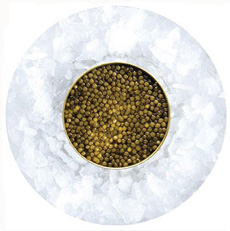 Golden Iranian Asetra, a.k.a. osetra. Photo courtesy CaviarCaviar.com. |
|
| AVRUGA CAVIAR or AVRUGA ROE The roe of the herring. An unpasteurized caviar with a smoky flavor and pearly black color, it is produced in Spain. Continue To Next Page: Caviar Terms With B |
 Avruga caviar. Photo courtesy BackyardGardener.com. |
|
© Copyright 2005-2026 Lifestyle Direct, Inc. All rights reserved. All images are copyrighted to their respective owners.